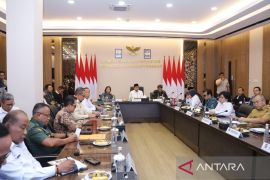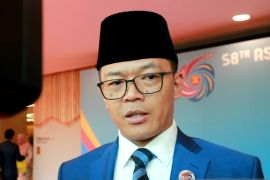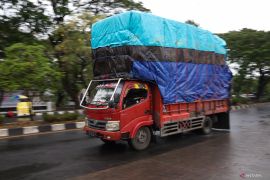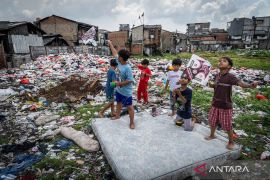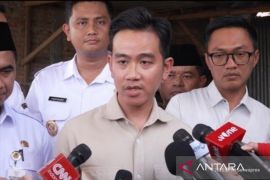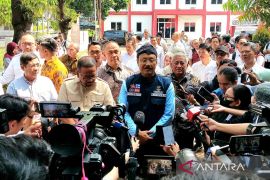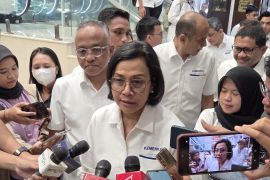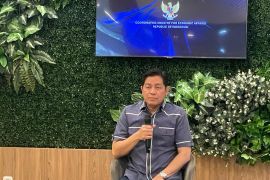The Indonesian government has claimed that the nation has achieved at least three of the eight goals and even could exceed some targets by 2015.Jakarta (ANTARA News) - Many developing countries including Indonesia have just less than three years to make significant progresses in poverty eradication, health, sanitation and education programs which are parts of the the Millennium Development Goals (MDGs)
April 5, 2013 will mark 1,000 days to the end of 2015 - the deadline for achieving the eight MDGs which were agreed by UN member nations in September 2000.
The eight goals that have to be achieved by 2015 are: Eradication of Extreme Poverty and Starvation; Achieving Universal Primary Education; Promotion of Gender Equality and Empowerment of Women; Reducing Child Mortality; Improvement of Maternal Health; Combating HIV/AIDS, Malaria and Other Infectious Diseases; Ensuring Sustainable Environment; and Developing a Global Partnership for Development.
The Indonesian government has claimed that the nation has achieved at least three of the eight goals and even could exceed some targets by 2015.
Since 1990, Indonesia has been able to reduce the number of people living in poverty, from 20.6 percent in 1990 to 11.9 percent in 2012, President Susilo Bambang Yudhoyono told the press after chairing the fourth meeting of the High-Level Panel of Eminent Persons on the Post-2015 Development Agenda, in Nusa Dua, Bali, on March 27, 2013 .
The country has achieved universal primary education for children by implementing the 9-year compulsory education policy. Infant mortality has been reduced from 68 per 1,000 births in 1991, to 34 in 2007, the head of state added.
However, Indonesia has to work harder to achieve some other goals, particularly those concerning the poverty eradication, the maternal and infant mortality rate reduction and combating the HIV/AIDS, Malaria and other infectious diseases.
Yudhoyono has expressed his optimism that the country would be able to achieve the MDGs by 2015. "We still have 2.5 years to catch up . We must focus on achieving the goals," he said.
As the MDG deadline is approaching, the United Nations (UN) has appointed President Yudhoyono as a co-chair of the High-Level Panel of Eminent Persons (HLPEP) on the Post-2015 Development Agenda, to formulate a new development framework. British Prime Minister David Cameron and Liberian President Ellen Johnson Sirleaf are also co-chairs of the Panel.
The 27-member Panel had previously held meetings respectively in New York (US), London (Britain) and Monrovia (Liberia). The fourth meeting was held in Bali on March 26 and 27, 2013.
To demonstrate Indonesia`s firm commitment to achieving the MDGs, President Yudhoyono on September 21, 2012, established the National Committee on Post-2015 Development Agenda under the Presidential Decree No. 29/2012, and appointed Kuntoro Mangkusubroto as the chairman.
No Doubt
To encourage all stakeholders to help the country meet the MDGs, the government presented the Indonesian MDG Awards (IMA) 2012 to those having significantly contributed to the national programs in line with the MDGs.
The IMA 2012 were given to 18 winners consisting of local administrations, NGO, and the private sectors considered being successful in implementing the MDGs, and two media for the best reporting on MDGs.
When presenting the awards in Nusa Dua, Bali, on March 26, 2013, Nila Moeloek, the Indonesian president`s special envoy for MDGs, said there should be no doubt about Indonesia`s commitment to the MDGs, given the role of President Yudhoyono as the HLPEP co-chair.
Nila Moeloek handed the awards for the category of maternal and infant health to Banjar District (West Java), NGO Perkumpulan Persada, the Medicine Faculty`s Student Executive Board of the University of Gajah Mada (UGM), and state oil and gas company PT Pertamina Persero`s Ende (West Nusa Tenggara) chapter.
Minister/Head of the National Development Planning Agency Armida S Alisjahbana presented the award for the category of nutrition to Bantul District (Yogyakarta).
Public Works Minister Djoko Kirmanto gave the awards for the category of access to clean water and sanitation, to Sleman District (Yogyakarta), PT Indocement Tunggal Prakarsa, the Green Foundation, and the State University of Semarang.
State Minister for Women`s Empowerment and Child Protection Linda Amalia Sari presented the awards for the category of combating HIV/AIDS, Malaria and other infectious diseases, to South Halmahera District (North Maluku), the University of Pandjajaran, and Adaro company.
Home Affairs Minister Gamawan Fauzi handed the awards for the education category to Payakumbuh District (West Sumatra), mineral water company Aqua Group, Jember University, and NGO "Yayasan Kampung".
Coordinating Minister for People`s Welfare Agung Laksono presented four special awards, respectively for the category of poverty eradication to the State University of Semarang; for the development motivator category to Poso District (Central Sulawesi); for the best province category to West Sumatra; and for the best media category to Haluan Padang and Kompas daily.
The juries of the IMA 2012 included Fasli Jalal of Andalas University (West Sumatra), Executive Director of the Partnership for Administration Reform Wicaksono Sarosa, Arum Atmawikarta of the National Development Planning Agency, Heru Prasetyo, and Soedarti Surbakti.
Earlier, when speaking before the IMA 2012 event, President Yudhoyono urged all stakeholders to help accelerate and enhance the MDG progress.
"Let`s do our best to use the remaining two to three years to accelerate and enhance (the MDG progress). We should not slow down our endeavors just because there is a discussion on the new cooperation framework on the post-2015," the president said before a number of ministers, governors, NGO activists, and winners of the IMA 2012.
He called on all stakeholders to create better coordination to help the nation achieve the MDGs.
The government has launched a program called "the Nusantara Enlightenment" with the aim of accelerating the national efforts to achieve several targets of the MDGs, particularly concerning the health improvement.
"We send teams comprising doctors, nurses, midwives, and other paramedics to remote villages. Frankly speaking, this copies `Indonesia Mengajar` program," Nila Moeloek said in Jakarta on March 18, 2013.
"Indonesia Mengajar" (Indonesia Teaches) is a program which was started in 2009 and has recruited and trained young Indonesians to work as teachers in remote and impoverished provinces.
The first teams of "the Indonesian Enlightenment" program were dispatched on October 28, 2012 to remote villages where they would work for one year in community health centers.
The teams were sent to Sikakap (Mentawai Island, West Sumatra), Tosari (Pasuruan District, East Java), Pakis Jaya (Karawang District, West Java), Ogotua (Toli-Toli District, Central Sulawesi), Lindu (Sigi District, Central Sulawesi), Kelay (Berau, East Kalimantan), and Ende (Ende District, East Nusa Tenggara). (*)
Reporter: Fardah
Editor: Heru Purwanto
Copyright © ANTARA 2013

